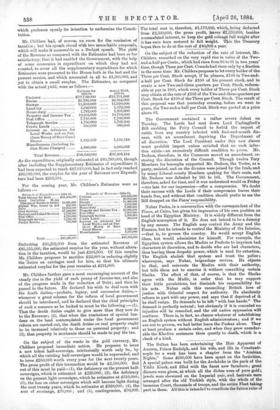Naar Pasha, in a conversation with the correspondent of the=
Times, at Cairo, has given his impression of his own position as. head of the Egyptian Ministry. It is widely different from the English-conception of it. He does not intend to be a dummy by any means. The English may control the Army and the- Finance, but he intends to control the Ministry of the Interior,. —that is, to govern the country. He would accept English ideas, but would administer for himself. For example, the Egyptian system allows the Mudirs or Prefects to imprison bad characters at discretion, and to decide who are bad characters,. thus leaving them despotic power, which is used for extortion- The English abolish that system and trust the police;. whereupon, says Nubar, brigandage revives. He objects to that, and reinvests the Mudirs with their authority, but tells them not to exercise it without consulting certain. Sheiks. The effect of that, of course, is that the Sheiks- agree with the Mudir, in order that he may support their little peculations, but diminish his responsibility for his acts. Nnbar calls this reconciling British love of justice with Oriental respect for authority. He absolutely refuses to part with any power, and says that if deprived of it, he shall resign. He demands to be left " with free hands." The demand is perfectly natural ; but obviously if it is conceded HO injustice will be remedied, and the old native oppression will continue. There is, in fact, no chance whatever of establishing an English system without English administrators ; and if we are not to govern, we had better leave the Pashas alone. They at least produce a certain order, and when they grow unendur- able the Khedive sentences them quietly to death, which is a check of a kind.


































 Previous page
Previous page